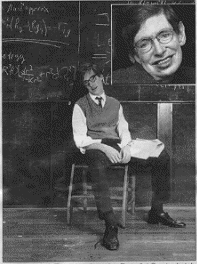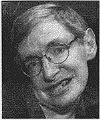TELEVISION BBC2 takes a look at physicist Stephen Hawking's
life as a young man at Cambridge
 |
| A brilliant mind: The up-and-coming Benedict Cumberbatch
takes the role of
Stephen Hawking
(inset) in the film |
Feeling sorry for brilliant theoretical physicist
Stephen
Hawking is not an option. This isn't a man who wants your pity; this
is a man who merrily sends himself up in
The Simpsons ('Your theory
of a donut-shaped universe is intriguing, Homer. I may have to steal it.').
What's more, it's entirely feasible that without
Motor Neurone Disease, which has
left this colossal intellect trapped in a wasted body, trundling around in
a motorised wheelchair and talking
synthesiser,
Hawking
would not be the icon of modern physics he is today. Seems it's the Hawking
hinterland rather than the actual science that folk find intriguing.
It's an idea the BBC has latched on to with new TV film Hawking, which
follows the young cosmologist during his time at
Cambridge University. 'We had a bit of
carte blanche because he's not well known as a young man, says Benedict
Cumberbatch, an up-and-coming young actor who had the challenging task of
portraying Hawking at the time when three strands of his life - his science,
his love affair with first wife Jane and his illness - came together.
Cumberbatch took pains, and advice from two people with MND, to get his portrayal
of the illness's manifestations spot on; the result is believable and emotive.
'It's very easy as an able-bodied person to latch on to something you think
is significant but get it wrong, he muses. 'People have portrayed MND as
a spasticity, and that's fairly easy to get as the twitches and gestures
are a tightening of muscles, but it's incorrect. MND is about the loosening
of muscles and that's very difficult. I had to go swimming or jogging at
the end of each day to remind my body it could do things like that,' he recalls.
'But I wanted it to be about a personality, not just a disease.'
He succeeded. The film is an energetic, entertaining and moving credit to
everyone involved, which includes Hawking himself. 'He was onboard for the
first draft,' explains Cumberbatch. 'Even before it was flagged up as a potential
project. It's been three years in the making - a long
gestation period. He was really happy with the final draft and really
liked the film as well. And he's not a well man at the moment so he couldn't
make the first screening, but he did see it in his hospital bed. It speaks
volumes for me that he likes it.
'Science is an emotional thing to him and he's a great communicator, which
makes him a great character in science,' continues Cumberbatch, grinning.
'A Brief History Of Time was a publishing phenomenon at the time and
still is. Because of that, when Hawking smiles there's something beyond it:
it's a thing of pure joy for him. It is a beautiful, emotional thing for
him, and what's great about the story is it shows that science isn't just
behind closed doors, nerdy stuff done by
blokes in white coats. It's reawakened my interest in popular science. It's
wonderful stuff to wallow in. Maybe more will stick now.' Mickey Noonan
Apr 13, BBC2, 9pm |

